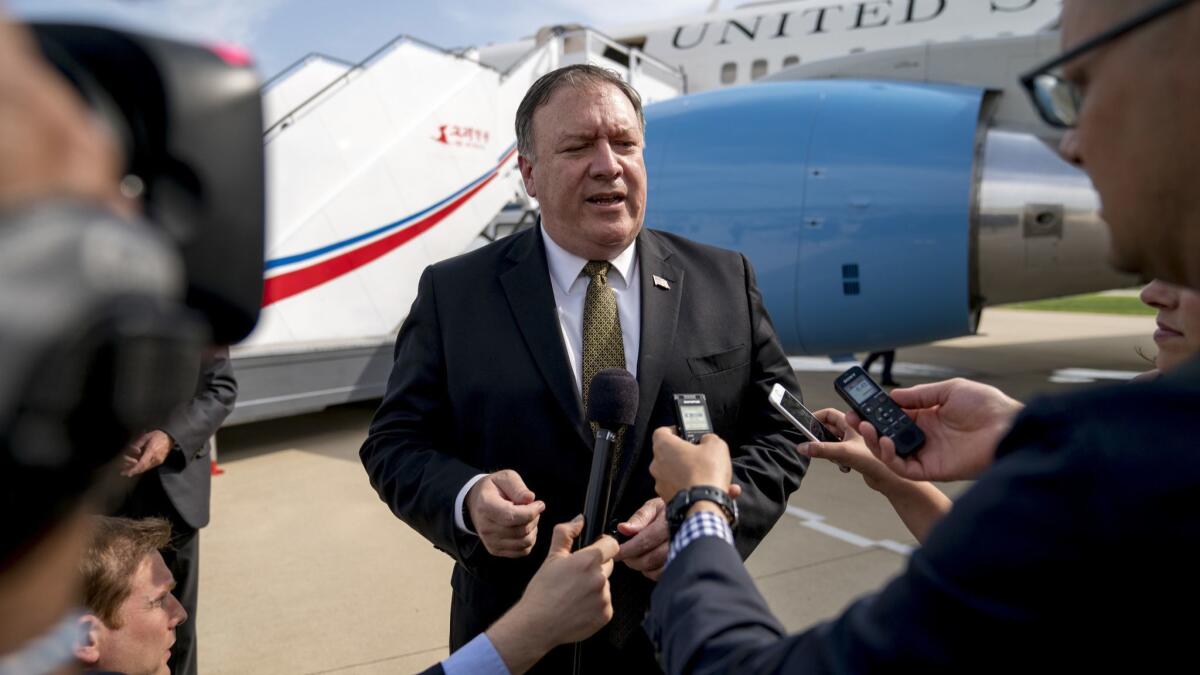North Korean officials are apparent no-shows for meeting on returning U.S. troops’ remains

Reporting from Seoul — North Korean officials did not turn up to a Thursday meeting with the U.S. military about repatriating the remains of American war dead, according to a U.S. official with knowledge of the situation.
In the meeting at the Korean Peninsula’s demilitarized zone, the two sides had been expected to discuss the return of U.S. troops’ remains from the 1950-53 Korean War — an arrangement that the State Department had announced after Secretary Michael R. Pompeo’s visit to Pyongyang last weekend.
State Department officials had said that the meeting would probably take place on July 12.
On Thursday, however, Department of Defense and United Nations Command officials were left waiting in the DMZ’s Joint Security Area. The expected North Korean officials never arrived, according to the official who requested anonymity as he was not permitted to talk publicly about the event.
“We were ready,” the official said. “It just didn’t happen. They didn’t show.”
North Korea accuses U.S. of making ‘unilateral’ demands in nuclear talks »
It was not immediately clear why North Korean officials did not attend the meeting or whether they had ever confirmed their intention to. The State Department did not respond to a request for comment.
Ahead of last month’s summit between President Trump and North Korean leader Kim Jong Un in Singapore, North Korean officials sometimes did not turn up for meetings where their U.S. counterparts were expecting them, causing tension between the two negotiating partners.
The repatriation of the remains of U.S. soldiers from North Korea has been a major issue between Washington and Pyongyang since the end of active conflict in the Korean War, when thousands of Americans were left in Korea either missing in action or as prisoners of war.
Hundreds of remains have been repatriated since 1990, but the process has been fraught with mistrust. The most recent transfer of remains between North Korea and the United States occurred in 2005.
Trump and Kim had pledged to recover more American remains when they met in Singapore on June 12. A statement signed by both leaders promised the “immediate repatriation of those already identified.”
After North Korea’s swipe, Pompeo must focus on pace and structure if nuclear talks are to succeed »
Trump told a crowd of supporters a week later that the remains of 200 Americans “have been sent back.” Military officials later contradicted that, but told reporters that they expected the remains to arrive within days and had made arrangements for their arrival, such as storing caskets near the DMZ.
Since the summit in Singapore, there has been increasing scrutiny of the agreement reached by Trump and Kim, with some experts suggesting that North Korea did not really intend to give up its nuclear weapons, the ultimate goal of the talks.
Roh Kyu-deok, a spokesman for South Korea’s Foreign Ministry, said the South Korean government is “constantly in contact with the U.S. counterpart” about progress of the talks on war remains repatriation, but declined to comment on any details, deferring to U.S. authorities.
According to estimates from the Pentagon, 7,700 U.S. troops are still unaccounted for from the Korean War. Of those, 5,300 are believed to have been killed north of the 38th Parallel, which marks the border between the two Koreas.
The Washington Post’s Min Joo Kim contributed to this report.
More to Read
Sign up for Essential California
The most important California stories and recommendations in your inbox every morning.
You may occasionally receive promotional content from the Los Angeles Times.








